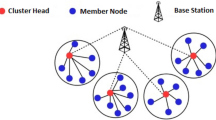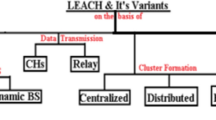Abstract
Wireless Sensor Networks (WSN) are composed of small sensor nodes that either transmit their sensed data to the sink node directly or transmit it to its respective cluster head, which then transmits it to the sink node. However, this consumes a lot of network bandwidth and energy from the constrained sensor nodes. To address these constraints, Mobile Agents (MA) paradigm can be used in WSNs, which may lead to better energy and bandwidth conservation. When a single mobile agent is insufficient to complete a task, multiple mobile agents can be deployed to perform in parallel and reduce network latency. The set of sensor nodes and their sequence that MAs must migrate to complete a task is called an itinerary. The planning of the itinerary is the most prominent and significant issue related to the MA-based system, including the determination of an appropriate number of MAs to be dispatched, determining the set of sensor nodes and their sequence to be visited by MAs. This paper proposes a fuzzy-based algorithm to partition Wireless Sensor Networks into a set of sensor nodes, called domains, for enhancing the efficiency of the WSN in terms of its prolonged operation. Experimental evaluations are conducted to compare the proposed algorithm with benchmarked algorithms. The paper suggests that the proposed algorithm's integration with MA-based systems can enhance their performance and prolong the WSN's lifetime.




Similar content being viewed by others
Data availability
All data generated or analyzed during this study are included in this published article.
References
Bendjima M, Feham M, Lehsaini M (2021) Directional itinerary planning for multiple mobile agents. Wirel Sens Netw. https://doi.org/10.1155/2021/5584581
Chen M, Gonzalez S, Leung VCM (2007) Applications and design issues for mobile agents in wireless sensor networks. IEEE Wirel Commun 14(6):20–26. https://doi.org/10.1109/MWC.2007.4407223
El Fissaoui M, Beni-hssane A, Saadi M (2018) Multi-mobile agent itinerary planning-based energy and fault aware data aggregation in wireless sensor networks. EURASIP J Wirel Commun Network 92. https://doi.org/10.1186/s13638-018-1099-0
Pourroostaei Ardakani S (2021) MINDS: mobile agent itinerary planning using named data networking in wireless sensor networks. J Sens Actuat Netw 10(2):28. https://doi.org/10.3390/jsan10020028
Lohani D, Varma S (2013) Itinerary planning using grey relational analysis for mobile agent based wireless sensor networks. Sixth International Conference Contemporary Computing (IC3), Noida, India, pp 29–34. https://doi.org/10.1109/IC3.2013.6612215
Daramola OA, Fakoya JT, Danjuma HI, Egwuche OS (2021) Towards clustering technique for a fault tolerance mobile agent-based system in wireless sensor networks. Int J Comput Sci Inf Secur 19(1):48–58. https://doi.org/10.5281/zenodo.4533402
Prapulla SB, Chandra J, Mudakavi MB, Shobha G, Thanuja TC (2016) Multi mobile agent itinerary planning using farthest node first nearest node next (FNFNNN) technique. 2016 International Conference on Computation System and Information Technology for Sustainable Solutions (CSITSS). IEEE, pp 105–111. https://doi.org/10.1109/CSITSS.2016.7779404
Chen M, Leung V, Mao S, Kwon T, Li M (2009) Energy-efficient itinerary planning for mobile agents in wireless sensor networks. IEEE International Conference on Communications, Dresden, Germany, pp 1–5. https://doi.org/10.1109/ICC.2009.5198997
Gavalas D, Venetis IE, Konstantopoulos C, Pantziou G (2016) Energy-efficient multiple itinerary planning for mobile agents-based data aggregation in WSNs. Telecommun Syst 63(4):531–545. https://doi.org/10.1007/s11235-016-0140-z
Hong W, Liu Z, Chen Y, Guo W (2016) Energy-efficient mobile agent communications for maximizing lifetime of wireless sensor networks. Wireless communications, networking and applications. Springer, New Delhi, pp 305–317. https://doi.org/10.1007/978-81-322-2580-5_29
Makki S, Wunnava SV (2007) Application of mobile agents in managing the traffic in the network and improving the reliability and quality of service. Int J Comput Sci 33(1):135
Nidhi, Upadhyaya S (2022) Fuzzy C-means clustering of network for multi mobile agent itinerary planning. Smart trends in computing and communications, vol 396. Springer, Warsaw, Poland, pp 589–598
Aloui I, Kazar O, Kahloul L, Servigne S (2015) A new itinerary planning approach among multiple mobile agents in wireless sensor networks (WSN) to reduce energy consumption. Int J Commun Netw Inf Secur 7(2):116–122. https://doi.org/10.17762/ijcnis.v7i2.1276
Aloui I, Kazar O, Kahloul L, Aissaoui A, Servigne S (2016) A new “data size” based algorithm for itinerary planning among mobile agents in wireless sensor networks, vol 36. Proceedings of the International Conference on Big Data and Advanced Wireless Technologies, pp 1–9. https://doi.org/10.1145/3010089.3010121
Wu C, Yan B, Yu R, Yu B, Zhou X, Yu Y, Chen N (2021) k-means clustering algorithm and its simulation based on distributed computing platform. Complexity. https://doi.org/10.1155/2021/9446653
Qadori HQ, Zulkarnain ZA, Hanapi ZM, Subramaniam S (2017) A spawn mobile agent itinerary planning approach for energy-efficient data gathering in wireless sensor networks. Sensors 17(6):1280–1296. https://doi.org/10.3390/s17061280
Chen M, Cai W, Gonzalez S, Leung VC (2010) Balanced itinerary planning for multiple mobile agents in wireless sensor networks. In: Zheng J, Simplot-Ryl D, Leung VCM (eds) Ad hoc networks. ADHOCNETS 2010. Lecture Notes of the Institute for Computer Sciences, Social Informatics and Telecommunications Engineering, vol 49. Springer, Berlin, Heidelberg. https://doi.org/10.1007/978-3-642-17994-5_28
Konstantopoulos C, Mpitziopoulos A, Gavalas D, Pantziou G (2009) Effective determination of mobile agent itineraries for data aggregation on sensor networks. IEEE Trans Knowl Data Eng 22(12):1679–1693. https://doi.org/10.1109/TKDE.2009.2032009
Mpitziopoulos A, Gavalas D, Konstantopoulos C, Pantziou G (2007) Deriving efficient mobile agent routes in wireless sensor networks with NOID algorithm. IEEE 18th International Symposium on Personal, Indoor and Mobile Radio Communications, pp 1–5. https://doi.org/10.1109/PIMRC.2007.4394337
Liu B, Cao J, Yin J, Yu W, Liu B, Fu X (2016) Disjoint multi mobile agent itinerary planning for big data analytics. J Wirel Commun Netw 1:1–12. https://doi.org/10.1186/s13638-016-0607-3
Mpitziopoulos A, Gavalas D, Konstantopoulos C, Pantziou G (2010) CBID: a scalable method for distributed data aggregation in WSNs. Int J Distrib Sens Netw 6(1):206517. https://doi.org/10.1155/2010/206517
Gavalas D, Pantziou G, Konstantopoulos C, Mamalis B (2006) New techniques for incremental data fusion in distributed sensor networks. Proceedings of the 11th Panhellenic Conference on Informatics, pp 599–608
Chou YC, Nakajima M (2018) A clonal selection algorithm for energy-efficient mobile agent itinerary planning in wireless sensor networks. Mob Netw Appl 23(5):1233–1246. https://doi.org/10.1007/s11036-017-0814-0
Kuila P, Gupta SK, Jana PK (2013) A novel evolutionary approach for load balanced clustering problem for wireless sensor networks. Swarm Evol Comput 12:48–56. https://doi.org/10.1016/j.swevo.2013.04.002
Mahmoudi M, Avokh A, Barekatain B (2022) SDN-DVFS: an enhanced QoS-aware load-balancing method in software defined networks. Cluster Comput 25:1237–1262. https://doi.org/10.1007/s10586-021-03522-x
Wu Q, Rao NS, Barhen J, Iyenger SS, Vaishnavi VK, Qi H, Chakrabarty K (2004) On computing mobile agent routes for data fusion in distributed sensor networks. IEEE Trans Knowl Data Eng 16(6):740–753. https://doi.org/10.1109/TKDE.2004.12
Sadrishojaei M, Navimipour NJ, Reshadi M et al (2022) A new clustering-based routing method in the mobile internet of things using a krill herd algorithm. Cluster Comput 25:351–361. https://doi.org/10.1007/s10586-021-03394-1
Rajagopalan R, Mohan CK, Varshney P, Mehrotra K (2005) Multi-objective mobile agent routing in wireless sensor networks, vol 2. 2005 IEEE Congress on Evolutionary Computation, pp 1730–1737. https://doi.org/10.1109/CEC.2005.1554897
Funding
All the co-authors have seen and agree with the contents of the manuscript and there is no financial interest to report.
Author information
Authors and Affiliations
Contributions
Each author has made substantial contributions to the conception or design of the work; or the acquisition, analysis, or interpretation of data.
Corresponding author
Ethics declarations
Ethics approval
This work does not contain any studies with human participants or animals performed by any of the authors.
Consent for publication
Not applicable.
Competing interests
The authors declare no competing interests.
Additional information
Publisher's Note
Springer Nature remains neutral with regard to jurisdictional claims in published maps and institutional affiliations.
Rights and permissions
Springer Nature or its licensor (e.g. a society or other partner) holds exclusive rights to this article under a publishing agreement with the author(s) or other rightsholder(s); author self-archiving of the accepted manuscript version of this article is solely governed by the terms of such publishing agreement and applicable law.
About this article
Cite this article
Kashyap, N., Upadhyaya, S., Poriye, M. et al. Assessing the efficacy of a novel adaptive fuzzy c-means (AFCM) based clustering algorithm for mobile agent itinerary planning in wireless sensor networks using validity indices. Peer-to-Peer Netw. Appl. (2024). https://doi.org/10.1007/s12083-024-01695-x
Received:
Accepted:
Published:
DOI: https://doi.org/10.1007/s12083-024-01695-x




